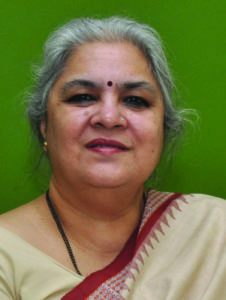The English rendering of “Amader Shantiniketan”, a charming memoir by the late Hindi writer Shivani, translated by her daughter Ira Pande, will be released under Penguin Random House India’s Vintage imprint next month.
This timeless memoir was written by Shivani nearly 50 years ago from her perspective as a child and young girl studying in Shantiniketan, the school set up by Rabindranath Tagore. It is a loving homage to a grand institution and its legendary gurus.
Along with the moving tributes she wrote when some of her beloved contemporaries passed away, the memoir is a sort of diptych that captures the spirit of the Ashram and the liveliness of its inmates, many of whom went on to become iconic Indians.
Shivani’s recall of her time there takes the reader into a magical space that remains as inspirational as it was to her when she went there all the way from Kumaon a lifetime ago.
“Amader Shantiniketan” said Ira Pande, “has always been the favourite of my mother’s works. Apart from recording an important part of the fashioning of the Bengal renaissance, the book is written from the perspective of a child.
It captures the innocence and the pristine, pastoral world that Tagore created, and brings alive people in a way that only a child can portray them”.
“This book was born to be translated into English now, at a time when that Bengal and that life has almost vanished.
Today, when I see the legacy of Tagore being fought over, I think this world needs to be remembered, and this school needs to be preserved in our memories,” she added.
Elizabeth Kuruvilla, Executive Editor, Ebury Publishing & Vintage, Penguin Random House India, said: “Shivani is a masterful storyteller, and in ‘Amader Shantiniketan’, she transports you to the carefree world of the childhood she spent at Shantiniketan.
Witty and filled with warmth and laughter, this is a rare, intimate view of life in Tagore’s experimental school, which shaped the most creative minds of the age.
These are stories that need to be read by adults and children alike, of a school that allowed its students to not just dream but also, importantly, to day-dream.”
Milee Ashwarya, Publisher, Ebury Publishing and Vintage, said “Amader Shantiniketan” takes the reader “on a trip to her formative years spent in Shantiniketan that had a huge influence on her life and her work.

This remarkable memoir with its vivid portrayal opens the window to a unique world, and the people who inhabited it giving us an insight into the influences and inspirations behind one of the foremost Hindi writers of twentieth century. I am delighted that Ira Pande has translated this gem, and brought it alive for many more readers”.
Gaura Pant ‘Shivani’ (1923 – 2003) was among the foremost Hindi writers of her time.
Born in Rajkot, her childhood was spent in various places as her father moved from one princely state to another.
As a young child, she was tutored by her scholar grandfather, Pandit Hariram Pande, a close associate of Pandit Madan Mohan Malviya and one of the founding faculty members of the Banaras Hindu University.
At the age of 12, she was sent along with her two siblings to Shantiniketan, where she spent nine magical years.
Throughout her life, Shivani lived by the teachings of her gurus at the Ashram and looked upon Bengal as her second home. Her literary output, which spans some 40 works, bears the deep imprint of both Kumaon and Bengal.
Best known for her short stories and novels and newspaper columns, Shivani also wrote several travelogues and a three-part autobiography before she passed away. Most of her novels were serialized in the popular magazines of the time and created a vast readership that was the envy of her contemporaries.
She was awarded the Padma Shri in 1979.
Starting as a lecturer in Panjab University, Ira Pande later switched to editing and publishing, working with several prominent English-language publishing houses. Her last editorial stint was as chief editor of the India International Centre’s Publication Division.
In 2005, she wrote a memoir of her mother titled “Diddi: My Mother’s Voice”, documenting the life and times of her mother.
Other translations followed, along with several edited volumes at the IIC.
She is now mainly a translator of Hindi writing and is working on a few projects.
In 2011, she was awarded the Sahitya Akademi prize for her translation of Manohar Shyam Joshi’s “T’ta Professor”, which also won the Crossword Translation prize in 2010.
She writes a regular column for the Tribune, published from Chandigarh. (IANS)



